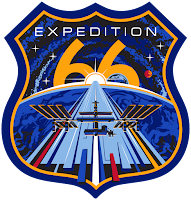ISS - Expedition 66 Mission patch.
Nov. 22, 2021
The International Space Station is gearing up for a new Russian docking module due to arrive on Friday. In the meantime, the Expedition 66 residents focused on a variety of human research and space physics aboard the orbital lab today.
Russia’s newest docking port, the Prichal module, sits atop a rocket at the Baikonur Cosmodrome in Kazakhstan counting down to a launch on Wednesday at 8:06 a.m. EST. It will arrive at the station on Friday where it will automatically dock to the Nauka multipurpose laboratory module at 10:26 a.m.
Image above: The Russian rocket with the Prichal docking module atop stands vertical at the Baikonur Cosmodrome launch pad in Kazakhstan. Image Credit: Roscosmos.
Cosmonauts Anton Shkaplerov and Pyotr Dubrov started Monday morning training for Prichal’s arrival. The duo from Roscosmos simulated the Russian docking port’s approach, rendezvous and docking on the tele-robotically operated rendezvous unit, or TORU. The TORU, located inside the Zvezda service module, can also be used to manually control and dock an approaching Russian spacecraft if necessary.
Human research continued on Monday as NASA Flight Engineers Raja Chari and Kayla Barron studied how the central nervous system adapts to microgravity. The astronauts took turns wearing a virtual reality headset while seated inside the Columbus laboratory module for the GRASP experiment. The study observes a crew member reaching for virtual objects to compare hand-eye coordination and vestibular changes before, during, and after a spaceflight mission.
International Space Station (ISS). Animation Credit: NASA
NASA Flight Engineer Mark Vande Hei worked on a pair of space physics experiments throughout Monday. Vande Hei first serviced samples inside the Electrostatic Levitation Furnace which enables the safe research of thermophysical properties of high temperature materials in weightlessness. Next, he opened up the Microgravity Science Glovebox and uninstalled hardware supporting research that observes processes involved in semiconductor crystal growth.
Flight Engineers Thomas Marshburn and Matthias Maurer worked throughout the day on a variety of robotics and maintenance activities. Marshburn worked on orbital plumbing tasks, collected station water samples for analysis, and took a robotics test for the Behavioral Core Measures study. Maurer partnered up with Chari practicing Canadarm2 robotic arm maneuvers planned for a spacewalk scheduled on Sept. 30th.
Related links:
Expedition 66: https://www.nasa.gov/mission_pages/station/expeditions/expedition66/index.html
Nauka multipurpose laboratory module: https://www.roscosmos.ru/tag/nauka/
Zvezda service module: https://www.nasa.gov/mission_pages/station/structure/elements/zvezda-service-module.html
Columbus laboratory module: https://www.nasa.gov/mission_pages/station/structure/elements/europe-columbus-laboratory
GRASP: https://www.nasa.gov/mission_pages/station/research/experiments/explorer/Investigation.html?#id=2038
Electrostatic Levitation Furnace: https://www.nasa.gov/mission_pages/station/research/experiments/explorer/Facility.html?#id=1536
Microgravity Science Glovebox: https://www.nasa.gov/mission_pages/station/research/experiments/explorer/Facility.html?#id=341
Semiconductor crystal growth: https://www.nasa.gov/mission_pages/station/research/experiments/explorer/Facility.html?#id=7965
Behavioral Core Measures: https://www.nasa.gov/mission_pages/station/research/experiments/explorer/Investigation.html?#id=7537
Canadarm2 robotic arm: https://www.nasa.gov/mission_pages/station/structure/elements/mobile-servicing-system.html
Space Station Research and Technology: https://www.nasa.gov/mission_pages/station/research/overview.html
International Space Station (ISS): https://www.nasa.gov/mission_pages/station/main/index.html
Image (mentioned), Animation (mentioned), Text, Credits: NASA/Mark Garcia.
Best regards, Orbiter.ch



